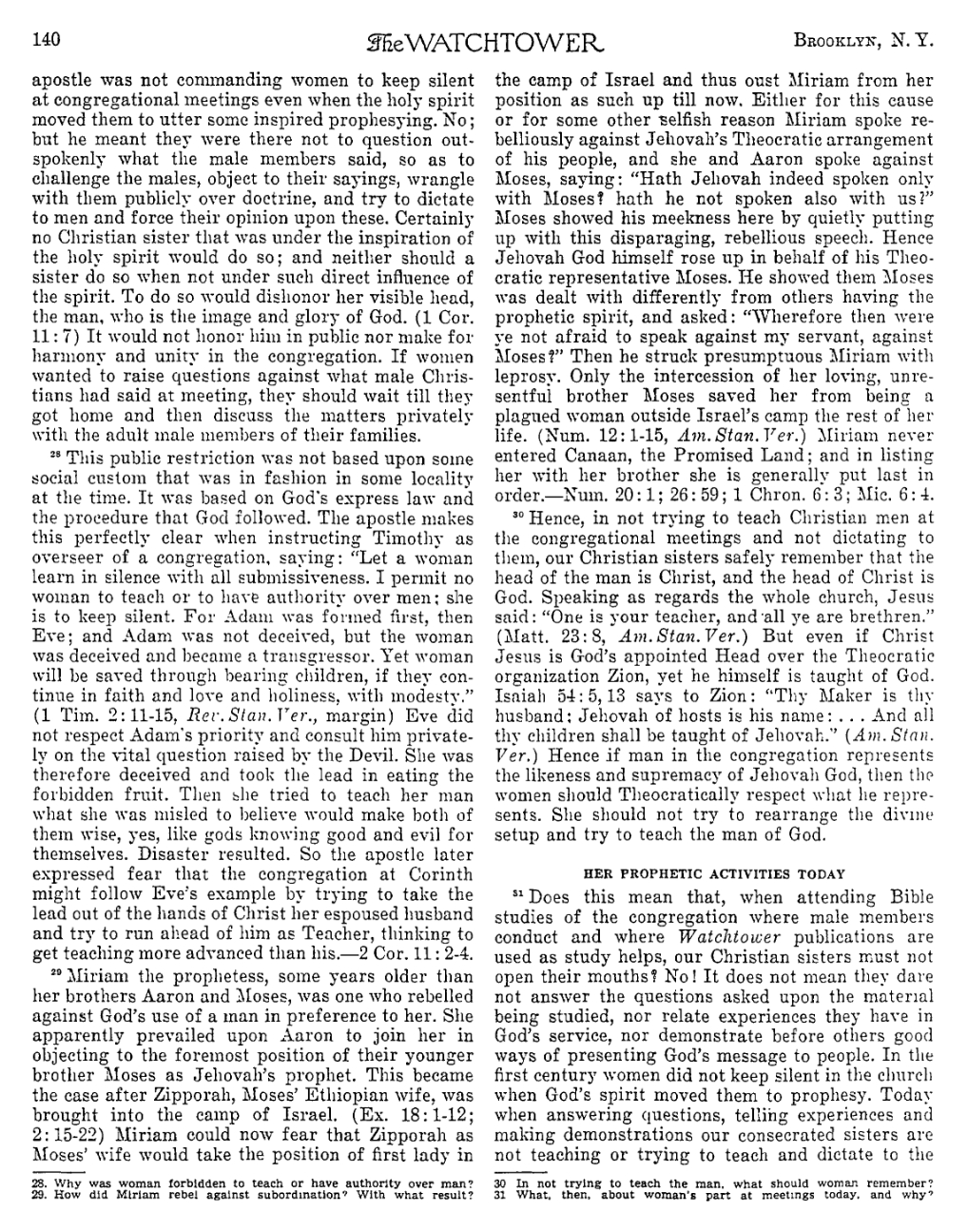This page has not been proofread
140
The WATCHTOWER
Brooklyn, N.Y.
apostle was not commanding women to keep silent at congregational meetings even when the holy spirit moved them to utter some inspired prophesying. No; but he meant they were there not to question outspokenly what the male members said, so as to challenge the males, object to their sayings, wrangle with them publicly over doctrine, and try to dictate to men and force their opinion upon these. Certainly no Christian sister that was under the inspiration of the holy spirit would do so; and neither should a sister do so when not under such direct influence of the spirit. To do so would dishonor her visible head, the man, who is the image and glory of God. (1 Cor. 11: 7) It would not honor him in public nor make for harmony and unity in the congregation. If women wanted to raise questions against what male Christians had said at meeting, they should wait till they got home and then discuss the matters privately with the adult male members of their families.
28 This public restriction was not based upon some social custom that was in fashion in some locality at the time. It was based on God's express law and the procedure that God followed. The apostle makes this perfectly clear when instructing Timothy as overseer of a congregation, saying: "Let a woman learn in silence with all submissiveness. I permit no woman to teach or to have authority over men; she is to keep silent. For Adam was formed first, then Eve; and Adam was not deceived, but the woman
was deceived and became a transgressor. Yet woman will be saved through bearing children, if they continue in faith and love and holiness, with modesty." (1 Tim. 2: 11-15, Rev. Stan. Ver., margin) Eve did not respect Adam's priority and consult him privately on the vital question raised by the Devil. She was therefore deceived and took the lead in eating the forbidden fruit. Then she tried to teach her man what she was misled to believe would make both of them wise, yes, like gods knowing good and evil for themselves. Disaster resulted. So the apostle later expressed fear that the congregation at Corinth might follow Eve's example by trying to take the lead out of the hands of Christ her espoused husband and try to run ahead of him as Teacher, thinking to get teaching more advanced than his.--2 Cor. 11: 2-4.
29 Miriam the prophetess, some years older than her brothers Aaron and Moses, was one who rebelled against God's use of a man in preference to her. She apparently prevailed upon Aaron to join her in
objecting to the foremost position of their younger brother Moses as Jehovah's prophet. This became the case after Zipporah, Moses' Ethiopian wife, was brought into the camp of Israel. (Ex. 18: 1-12; 2: 15-22) Miriam could now fear that Zipporah as Moses' wife would take the position of first lady in
the camp of Israel and thus oust Miriam from her position as such up till now. Either for this cause or for some other selfish reason Miriam spoke rebelliously against Jehovah's Theocratic arrangement of his people, and she and Aaron spoke against Moses, saying: "Hath Jehovah indeed spoken only with Moses? hath he not spoken also with us?" Moses showed his meekness here by quietly putting up with this disparaging, rebellious speech. Hence Jehovah God himself rose up in behalf of his Theocratic representative Moses. He showed them Moses was dealt with differently from others having the prophetic spirit, and asked: "Wherefore then were ye not afraid to speak against my servant, against Moses?" Then he struck presumptuous Miriam with leprosy. Only the intercession of her loving, unresentful brother Moses saved her from being a plagued woman outside Israel's camp the rest of her life. (Num. 12: 1-15, Am. Stan. Ver.) Miriam never entered Canaan, the Promised Land; and in listing her with her brother she is generally put last in order. - Num. 20: 1; 26: 59; 1 Chron. 6: 3; Mic. 6: 4.
30 Hence, in not trying to teach Christian men at the congregational meetings and not dictating to them, our Christian sisters safely remember that the head of the man is Christ, and the head of Christ is God. Speaking as regards the whole church, Jesus said: "One is your teacher, and all ye are brethren." Matt. 23:8, Am. Stan. Ver.) But even if Christ Jesus is God's appointed Head over the Theocratic organization Zion, yet he himself is taught of God. Isaiah 54:5, 13 says to Zion: "Thy Maker is thy husband; Jehovah of hosts is his name:... And all
thy children shall be taught of Jehovah." (Am. Stan. Fer.) Hence if man in the congregation represents the likeness and supremacy of Jehovah God, then the' women should Theocratically respect what he represents. She should not try to rearrange the divine setup and try to teach the man of God.
HER PROPHETIC ACTIVITIES TODAY
31 Does this mean that, when attending Bible studies of the congregation where male members conduct and where Watchtower publications are used as study helps, our Christian sisters must not open their mouths? No! It does not mean they dare not answer the questions asked upon the material being studied, nor relate experiences they have in God's service, nor demonstrate before others good ways of presenting God's message to people. In the first century women did not keep silent in the church when God's spirit moved them to prophesy. Today when answering questions, telling experiences and making demonstrations our consecrated sisters are not teaching or trying to teach and dictate to the
